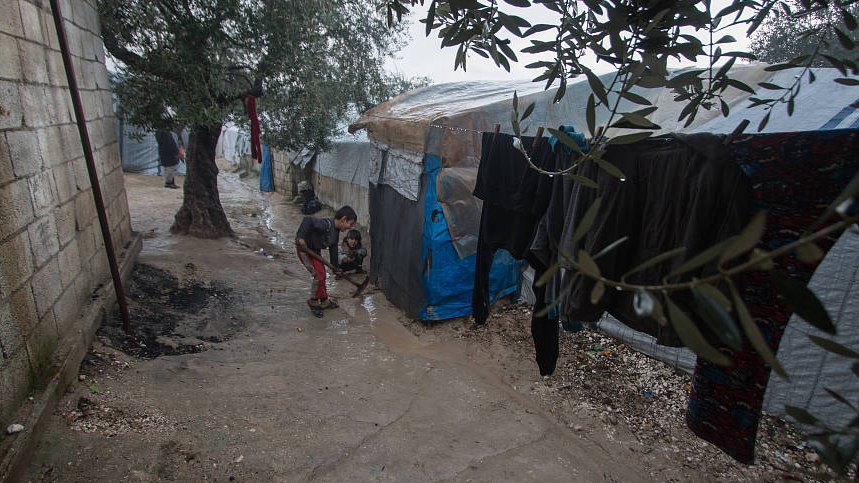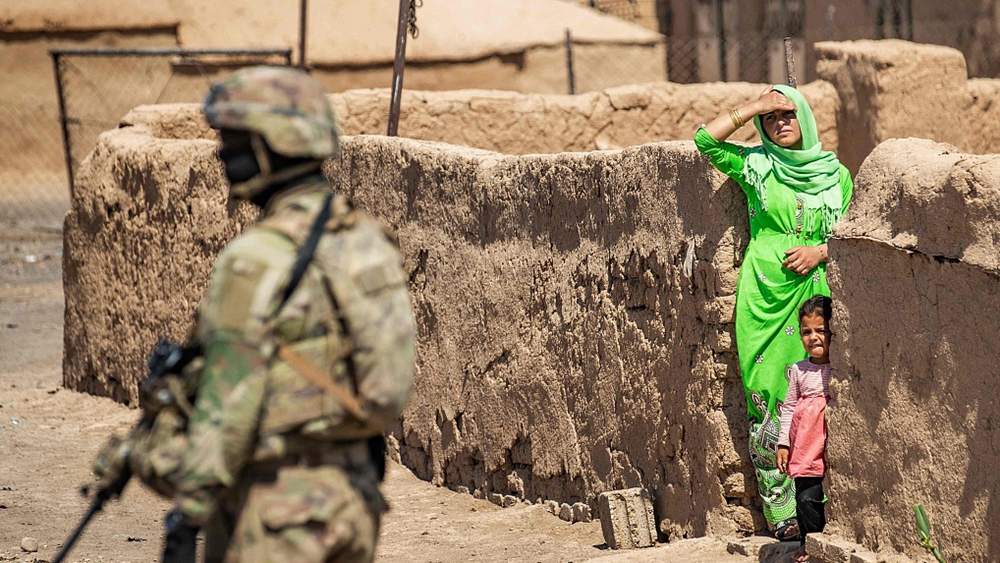
Refugee camps damaged by rain in Idlib, Syria, December 19, 2021. /CFP
Refugee camps damaged by rain in Idlib, Syria, December 19, 2021. /CFP
Editor's note: Bobby Naderi is a London-based journalist, guest contributor in print, radio and television and documentary filmmaker. The article reflects the author's opinions and not necessarily the views of CGTN.
On January 24, the world rolled around yet again to another United Nations Human Rights Council (UNHRC) review of Damascus as Western powers lined up to slam the Syrian government and brand the treatment of its citizens appalling – amid much self-congratulation and corporate media congratulations.
Damascus, for its part, said foreign occupation in the country in support of armed terrorist groups had had a catastrophic impact on human rights. "This has limited the state's ability to take up its role as the guardian of citizens' human rights," Syrian Deputy Foreign Minister Bashar Jaafari told the council in Geneva.
Jaafari's argument in no way suggests that Syria does not have any human rights issues. It is prima facie evidence that human rights challenges are faced just like any other country does. The point is to understand how certain powers deliberately distort realities in countries that are considered to pursue alternative models that challenge their hegemony.
The mayhem of advancing colonial interests
Taking a brief look backward, the historical record tells us how the Pentagon's generals had a field day when former U.S. President Barack Obama ordered the U.S. military to do just about anything in Syria to further America's economic, military and strategic interests. He launched the Syrian war in 2014 under a congressional resolution, even putting a stamp of approval on and $500 million into a training program for Syrian rebel groups.
Whether the UNHRC likes it or not, the U.S. and its uncertain allies own the failed Syrian catastrophe and whatever comes with the quagmire of their "democracy" experiment, including the refugee crisis, food shortage, terrorism and human rights abuses.
It's certainly a propitious moment for the UNHRC to come up with something new, another avenue to head down perhaps, one that goes by the name of impartiality. The sad irony is that even the council is under the illusion that human rights and democracy in Syria are tied to the cultural traditions of the West and that Washington can play the democracy card anywhere.
The council has an opportunity to end this mistake and repeal its bias. These truths are self-evident. Human rights and democracy are not the consequence of Western philosophy and culture alone, nor are they tied to the cultural traditions and policies of the West. They follow the tradition of universal justice and morality.
Speaking of justice and morality, as the brutal conflict between the Syrian government and rebel forces rages, as the Pentagon arms rebel factions and continues an air campaign that fuels the civil war, as other actors carry their own airstrikes, and as Syrians flee for their lives amid untold violence and misery, how is it possible for the Syrian government under economic sanctions to feed its displaced citizens, let alone protect their basic human rights?

A U.S. military patrol in Syria's northeastern Hasakeh Province, June 22, 2021. /CFP
A U.S. military patrol in Syria's northeastern Hasakeh Province, June 22, 2021. /CFP
Pentagon statements run counter to the facts
As acknowledged by former U.S. President Donald Trump, the war in Syria is "only for the oil." The translation is that U.S. forces are not there to fight terrorists or spread democracy, despite Pentagon officials trying to make the war about democracy and human rights.
Things got complicated for the Pentagon when during a rally, Trump lauded his decision to retain troops in eastern Syria to control oil fields and even bring American companies to extract the oil there, despite warnings that such a move could constitute a war crime. He said, "People said to me 'why are you staying in Syria.' Because I kept the oil, which frankly we should have done in Iraq. We have the oil, really secure."
As a practical matter, the new tenants of the White House are also motivated by the same oil incentive and regional designs. They would not be spending billions of dollars to fortify military bases in Syria unless they perceived that the expense was somehow reimbursed. They only left Afghanistan because it had no oil.
Depending on which version of the myth you read, a basic understanding of history and economics could demonstrate how U.S. President Joe Biden's policy is also about the U.S. securing permanent access to energy resources in Syria and the region. It is intended to protect the strategic petrodollar system. Protecting the current "dollars for oil" arrangement requires the U.S. to control and regulate the Middle East's flow of natural gas resources to Europe, as well.
On the face of it, the global gamblers have the audacity to send their rebels to Syrian peace talks to help rebrand their failing efforts. The rebels actively do the bidding of U.S. interests and are compensated in exchange for cash and eliminating rivals. As appalling as it may be, it's all about changing the story and pulling Syria into America's sphere of influence.
With such background, it is essential to recognize the efforts the Syrian civil society could make to end such a long-drawn-out nightmare. They could plan for grassroots initiatives for peace and reconciliation this year. A broader engagement that goes beyond the main political actors to include local civil society, ethnic leaders, and representatives of refugees and displaced populations could help upgrade Syrian democracy at the expense of the shock-and-awe disaster by U.S. license. There is almost no way to overemphasize how national dialogue and reconciliation could eventually free Syrians from the cycle of violence that the U.S. military has produced.
(If you want to contribute and have specific expertise, please contact us at opinions@cgtn.com.)

